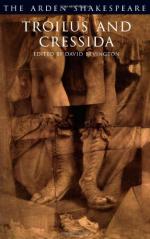|
This section contains 4,231 words (approx. 15 pages at 300 words per page) |

|
SOURCE: "Forms and Their Meaning: 'Monumental Mock'ry'," in Shakespeare's Living Art, Princeton University Press, 1974, pp. 317-23, 345-9.
In the following excerpt, Colie argues that in Troilus and Cressida Shakespeare attacks literature at its very source by turning upside down Homeric values and by "stripping Troilus, Cressida, and Pandarus of their recognizable, rich, highly complex humanity with which Chaucer had endowed them. "
In Troilus and Cressida, the reader faces problems much like those presented by Love's Labour's Lost: working with many different devices and forms, the playwright brings them seriously into question, showing up their emptiness and challenging their meaning. The poet has made his double plot1 in Troilus and Cressida out of the metaphor so common in erotic poetry, that love is "like" war; has given us a full war-plot (and how laden with accrued meanings this particular warplot is!) played off against a full love-plot, from which...
|
This section contains 4,231 words (approx. 15 pages at 300 words per page) |

|


